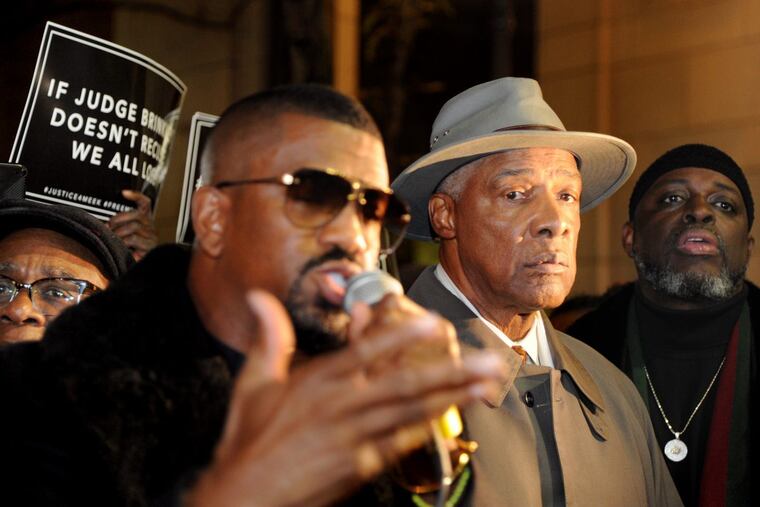Other people of color deserve protests in the street besides Meek Mill | Solomon Jones
Rapper Meek Mill sealed his own fate by violating his probation. Many black and brown people have done nothing wrong, yet we don't take to the streets to protest the wrongs against them.

The puzzling case of Philadelphia rapper Meek Mill, who was recently sentenced to two to four years in prison by Common Pleas Judge Genece Brinkley after he violated his probation yet again, has split the black community into two equally enraged camps.
Hundreds who took to the streets on Monday night in an effort to "Free Meek Mill" believe that a black judge with a personal grudge and a racist criminal justice system that targets young black men unjustly treated the man born Robert Rihmeek Williams. Others believe Mill, who had several probation violations before he was sentenced to prison, should have known better than to violate his probation again.
Here's what I believe: Mill must take the lion's share of responsibility for his predicament. And it frankly troubles me to watch a bevy of celebrities whom I respect — people such as Jay Z, Julius Erving and Malcolm Jenkins — join other African Americans in portraying Mill as a victim.
In truth, Mill is a volunteer.
Even if the arrests that led to his imprisonment were for minor infractions, such as a fight at the St. Louis airport, or popping wheelies on a motorbike in New York, even if the charges were eventually dropped or reduced, Mill had to know he couldn't fail a drug test or flout travel restrictions that were part of his probation. But he did, and that can't be ignored.
Nor can we ignore the fact that Mill is black, because statistics gathered by everyone from the American Civil Liberties Union to the Federal Bureau of Justice Statistics show that blacks get longer sentences than whites do for similar offenses.
And don't tell me the hyper-punitive sentencing of Mill doesn't smack of racism just because the judge in question is black. Black judges can be tools of racism, just as their white counterparts can. In fact, black judges can sometimes be worse.
In their zeal to prove their loyalty to the system, black judges, like black cops and black prosecutors, can sometimes overcompensate in an effort to show racial impartiality. That can spell disaster for the young black men who come in contact with them.
I don't know if that's what's at play here, but when it comes to Brinkley, Mill's team is making accusations far more sinister than that.
Mill's lawyer, Joe Tacopina, allegedly said that Brinkley engaged in bizarre behavior, including going to a homeless shelter to watch Mill perform community service, and trying to get Mill to ditch his relationship with Jay Z's Roc Nation to sign with Philadelphia music executive Charlie Mack.
Those accusations have not been proved, Brinkley is not publicly commenting, and Mack says he has no relationship to the judge. But numerous published reports say Brinkley is now under FBI investigation in connection with her personal relationships as they relate to Mill's case.
And for me, that is the problem.
The air of celebrity surrounding Mill — a former beau of superstar rapper Nicki Minaj — has seemingly blinded us to the the millions of other young black men on probation and parole.
At the end of 2015, approximately 4.65 million people were on probation, parole, or some other form of community-based supervision, according to the Bureau of Justice Statistics. Thirty percent of probationers were black, and 38 percent of parolees were black, though blacks make up only 13 percent of the country's population.
Those disparities are reflective of the overall pattern of injustice in the American systems of prison, probation and parole. The Sentencing Project has found that when a black person and a white person commit a similar offense in America, the black person is more likely to be arrested. Once arrested, we are more likely to be charged. Once charged, we are more likely to be convicted. Once convicted, we are more likely to face longer sentences.
That kind of disparity is evident in the probation and parole sectors, as well, and Mill's case illustrates that truth.
But if we take to the streets only when a celebrity is caught in a system whose ultimate goal is to send us to prison, then we are ultimately to blame for the fate of those we leave behind.
Every black Philadelphian, including myself, should be protesting the criminal justice system as a whole. And when we're finished, we should protest the other systems that are killing us.
When 44 percent of city-funded construction jobs with employment opportunity plans employed no people of color in fiscal year 2015, we should be in the streets.
When 86 percent of the children in our nearly $3 billion-a-year public school system are black or brown, and children go without library books, we should be in the streets.
When nearly one out of three black people in Philadelphia lives in poverty, we should be in the streets.
If throngs of black folk can hit the streets for a rapper who set himself up for a jail sentence, we can hit the streets for those who didn't do anything wrong.
Solomon Jones is the author of 10 books. Listen to him weekdays from 10 am to Noon on Praise 107.9 FM.